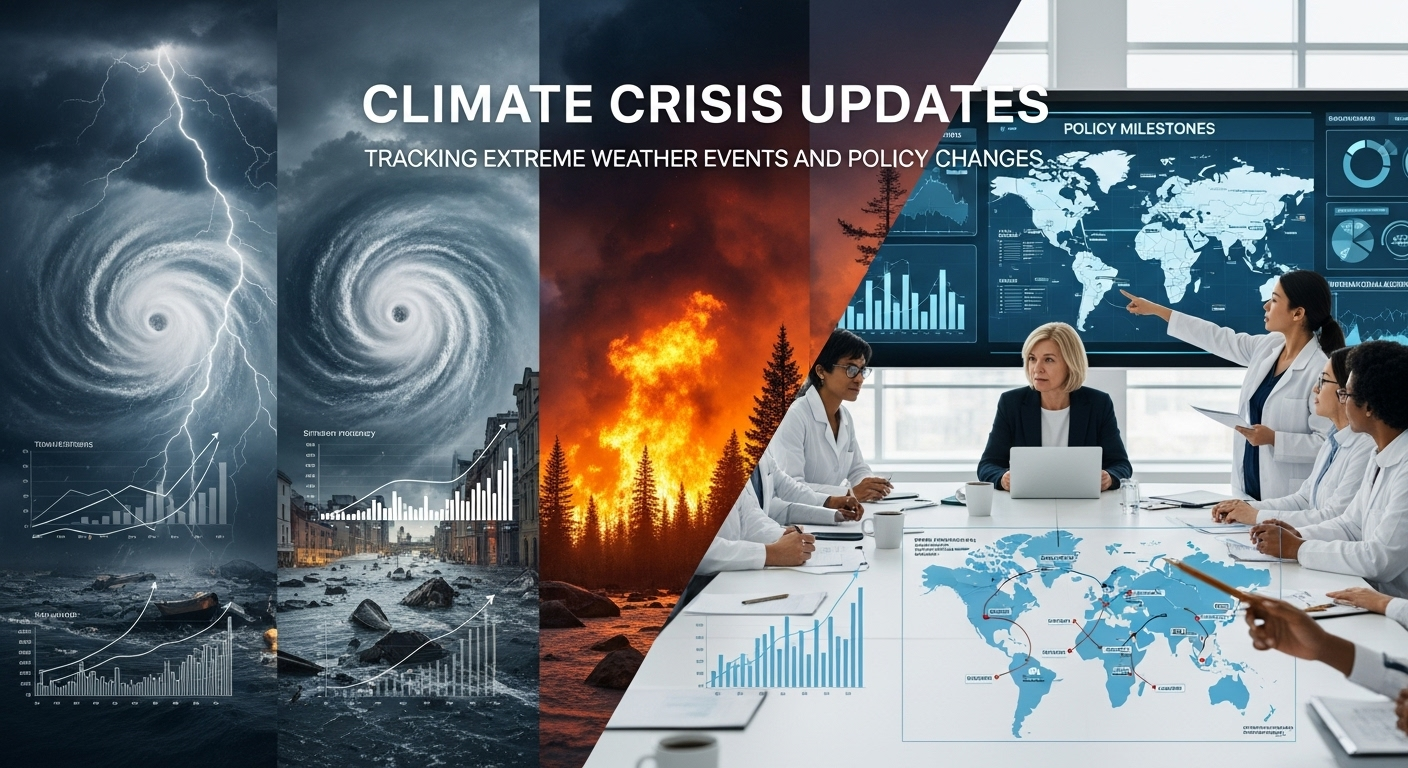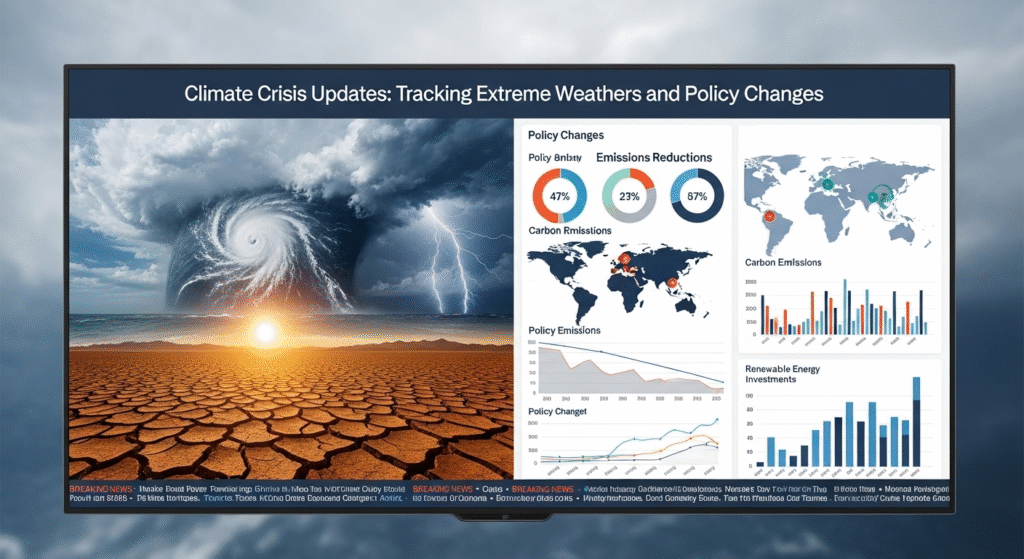Okay, let’s be real. The climate crisis? It’s not some distant threat anymore. It’s the headline news, the topic dominating every other conversation. The planet is sending us postcards written in floods, wildfires, and heatwaves so intense they feel like standing too close to a furnace. And the frustrating thing is, while the science has been screaming at us for decades, turning the ship around? Well, that’s proving to be a whole different ballgame. Are we even close?
You see, I’ve been following climate policy for…well, let’s just say a while. And sometimes, it feels like watching a particularly slow-motion train wreck. There are these moments of incredible progress, flashes of innovation, but then…BOOM. Political gridlock, economic downturns, unforeseen consequences – it’s never a straightforward path, is it? But that’s also why it’s so damn interesting (in a morbid sort of way, maybe).
The Latest on Extreme Weather: What’s Happening Now?

Extreme weather events are no longer extreme, are they? They’re just…weather. Seems like every week brings news of another record-breaking hurricane, devastating drought, or unprecedented ice melt. What happened to the four seasons? Remember those? The Mediterranean region, for example, has been grappling with increasingly severe heatwaves, impacting agriculture and tourism. Wildfires have become a near-constant threat in many parts of the world, releasing even more carbon into the atmosphere. It’s a vicious cycle.
And it’s not just about the sheer intensity of these events; it’s also about their frequency and geographic distribution. Places that were once considered relatively safe are now experiencing climate-related disasters. Coastal communities face rising sea levels, threatening displacement and economic devastation. Check this out.
But – and this is a big but – focusing solely on the doom and gloom can be paralyzing. It’s crucial to understand what’s happening, yes, but also to recognize the efforts being made to mitigate these impacts. Which brings us to…
Policy Changes: Are We Making Any Progress?
Here’s the thing: policy changes are, by their nature, slow. They’re messy. They involve compromise (which often feels like surrender). And they rarely satisfy everyone. But that doesn’t mean they’re not important. Think about it this way: We need systemic change, which means policy change.
The Paris Agreement, for all its flaws, remains a crucial framework for international cooperation. Countries are setting (or, in some cases, re-setting) their emissions reduction targets. The EU’s Green Deal is a bold attempt to transform the European economy into a sustainable one. And, increasingly, we’re seeing action at the state and local levels, with cities and regions pioneering innovative climate solutions. For example, did you know that numerous cities are pushing for 100% renewable energy by [date]? Check out this Wikipedia Article.
But…policy implementation is where the rubber meets the road. And that’s where things often get complicated. Funding gaps, regulatory hurdles, political opposition – these are just some of the challenges that need to be overcome. One of the links from the [Internal Link Pool] is navigating-the-ai-revolution-staying-informed-in-a-world-of-algorithms, It is also important to consider the role technology plays in finding the solutions.
Innovation and Adaptation: Hope on the Horizon?
I’ve got to admit, this part fascinates me. While policy battles rage on, there’s a whole ecosystem of innovation bubbling beneath the surface. From renewable energy technologies to carbon capture solutions to sustainable agriculture practices, people are finding new and creative ways to address the climate crisis. Take, for example, the advancements in direct air capture technology. These aren’t silver bullets, mind you, but they offer a glimmer of hope. A while ago I read how does the search console reveal ai overviews, and I think it also relates to that we need more data to process and get good solutions and new discoveries.
Adaptation is just as crucial as mitigation. As the climate changes, we need to find ways to protect vulnerable communities and ecosystems. That might mean building sea walls, developing drought-resistant crops, or relocating populations from areas at high risk. These are difficult choices, no doubt, but they’re necessary. Here’s a short list of some adaptation actions:
- Building flood defenses
- Setting up early warning systems
- Switching to drought-resistant crops
FAQ: Climate Crisis Questions You’re Probably Asking
Why does it feel like nothing is changing fast enough?
Great question! Honestly, it’s because a lot of things need to happen simultaneously. We need technological breakthroughs, policy shifts, behavioral changes, and, perhaps most importantly, a fundamental shift in our values. It’s easy to feel discouraged when progress seems slow, but remember that even small steps forward contribute to the bigger picture.
How can I tell if the climate crisis updates I’m seeing are accurate?
This is a tough one, given the amount of misinformation out there. Look for information from reputable sources like peer-reviewed scientific journals, government agencies, and established news organizations. Be wary of sensationalized headlines or claims that seem too good (or too bad) to be true. And always consider the source’s potential biases.
Is there anything I can actually do to make a difference?
Absolutely! While systemic change is essential, individual actions matter too. Reduce your carbon footprint by conserving energy, eating less meat, and using public transportation. Support businesses and organizations that are committed to sustainability. Talk to your friends and family about the climate crisis. And, most importantly, vote for politicians who will prioritize climate action.
What’s the deal with carbon offsets? Are they legit?
Carbon offsets can be a tricky area. The idea is that you compensate for your carbon emissions by funding projects that reduce emissions elsewhere (e.g., planting trees or investing in renewable energy). However, not all carbon offset projects are created equal. Some are poorly designed or don’t deliver the promised benefits. Do your research and choose reputable offset providers that are transparent about their projects and methodologies.
So, where does this leave us? Maybe a bit overwhelmed. Probably a little anxious. But hopefully, also a little more informed and motivated to take action. The climate crisis is a challenge unlike any we’ve faced before. But it’s also an opportunity to build a more sustainable, equitable, and resilient future. And, honestly, I think we’re up for it.



